|
De Oostenrijkse dichter Georg Trakl werd op 3 februari 1887 in Salzburg geboren. Zie ook alle tags voor Georg Trakl op dit blog.
Im roten Laubwerk voll Guitarren...
Im roten Laubwerk voll Guitarren
Der Mädchen gelbe Haare wehen
Am Zaun, wo Sonnenblumen stehen.
Durch Wolken fährt ein goldner Karren.
In brauner Schatten Ruh verstummen
Die Alten, die sich blöd umschlingen.
Die Waisen süß zur Vesper singen.
In gelben Dünsten Fliegen summen.
Am Bache waschen noch die Frauen.
Die aufgehängten Linnen wallen.
Die Kleine, die mir lang gefallen,
Kommt wieder durch das Abendgrauen.
Vom lauen Himmel Spatzen stürzen
In grüne Löcher voll Verwesung.
Dem Hungrigen täuscht vor Genesung
Ein Duft von Brot und herben Würzen
Musik im Mirabell
Ein Brunnen singt. Die Wolken stehn
Im klaren Blau, die weißen, zarten.
Bedächtig stille Menschen gehn
Am Abend durch den alten Garten.
Der Ahnen Marmor ist ergraut.
Ein Vogelzug streift in die Weiten.
Ein Faun mit toten Augen schaut
Nach Schatten, die ins Dunkel gleiten.
Das Laub fällt rot vom alten Baum
Und kreist herein durchs offne Fenster.
Ein Feuerschein glüht auf im Raum
Und malet trübe Angstgespenster.
Ein weißer Fremdling tritt ins Haus.
Ein Hund stürzt durch verfallene Gänge.
Die Magd löscht eine Lampe aus,
Das Ohr hört nachts Sonatenklänge.
Transformatie van het kwaad (Fragment)
Wat dwingt je stil te staan op de vermolmde trap, in het huis van je vaders? Loden zwartheid. Wat til je met zilveren hand naar je ogen; en sla je je oogleden neer als dronken van papaver? Maar door de muur van steen zie je de sterrenhemel, de mellcweg, Saturnus; rood. Razend tegen de muur van steen klopt de kale boom. Jij op vermolmde treden: boom, ster, steen! Jij, een blauw dier dat zacht beeft; jij, de bleke priester die het slacht op het zwarte altaar. 0 je glimlach in het donker, treurig en kwaad, zodat een kind in zijn slaap verbleekt. Een rode vlam ontsprong aan je hand en een nachtvlinder verbrandde erin. 0 de fluit van het licht; o de fluit van de dood. Wat dwong je stil te staan op de vermolmde trap, in het huis van je vaders? Beneden aan de poort klopt een engel met een vinger van kristal. 0 de hel van de slaap; donkere steeg, bruin tuintje. Zachtjes klinkt in de blauwe avond de gestalte van de doden. Groene bloemetjes fladderen om hen heen en hun gezicht heeft hen verlaten. Of het buigt zich verbleekt over het koude voorhoofd van de moordenaar in het donker van het voorhuis; aanbidding, purperen vlam van de wellust; wegstervend stortte de slaper over zwarte treden het donker in. Iemand verliet je op het kruispunt en jij kijkt lang terug. Zilveren stap in de schaduw van vergroeide appelboompjes. Purper schittert de vrucht in het zwarte takwerk en in het gras vervelt de slang. 0! het duister; het zweet, dat op het ijzige voorhoofd verschijnt en de treurige dromen in de wijn, in de dorpsherberg onder zwartgerookte balken. Jij, nog wildernis, die rozige eilanden tovert uit de bruine tabakswolken en uit je binnenste de wilde schreeuw van een griffioen haalt, wanneer die om zwarte klippen jaagt in zee, storm en ijs. Jij, een groen metaal en van binnen een vurig gezicht dat wil weggaan en zingen over de beenderheuvel van sombere tijden en de vlammende val van de engel. 0! vertwijfeling, die met stomme schreeuw op de knieën valt.
Een dode bezoekt je. Uit het hart stroomt het zelfvergoten bloed en in zwarte wenkbrauw nestelt een onuitsprekelijk ogenblik; donkere ontmoeting. Jij — een purperen maan, wanneer die in de groene schaduw van de olijfboom verschijnt. Dan volgt onvergankelijke nacht.
Vertaald door Frans Roumen
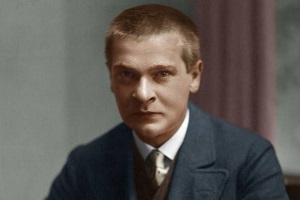
Georg Trakl (3 februari 1887 – 4 november 1914)
De Amerikaanse dichter, schrijver en essayist Paul Auster werd geboren op 3 februari 1947 in Newark, New Jersey. Zie ook alle tags voor Paul Auster op dit blog.
Uit: City of Glass
“It was a wrong number that started it, the telephone ringing three times in the dead of night, and the voice on the other end asking for someone he was not. Much later, when he was able to think about the things that happened to him, he would conclude that nothing was real except chance. But that was much later. In the beginning, there was simply the event and its consequences. Whether it might have turned out differently, or whether it was all predetermined with the first word that came from the stranger’s mouth, is not the question. The question is the story itself, and whether or not it means something is not for the story to tell.
As for Quinn, there is little that need detain us. Who he was, where he came from, and what he did are of no great importance. We know, for example, that he was thirty-five years old. We know that he had once been married, had once been a father, and that both his wife and son were now dead. We also know that he wrote books. To be precise, we know that he wrote mystery novels. These works were written under the name of William Wilson, and he produced them at the rate of about one a year, which brought in enough money for him to live modestly in a small New York apartment. Because he spent no more than five or six months on a novel, for the rest of the year he was free to do as he wished. He read many books, he looked at paintings, he went to the movies. In the summer he watched baseball on television; in the winter he went to the opera. More than anything else, however, what he liked to do was walk. Nearly every day, rain or shine, hot or cold, he would leave his apartment to walk through the city—never really going anywhere, but simply going wherever his legs happened to take him.
New York was an inexhaustible space, a labyrinth of endless steps, and no matter how far he walked, no matter how well he came to know its neighborhoods and streets, it always left him with the feeling of being lost. Lost, not only in the city, but within himself as well.
Each time he took a walk, he felt as though he were leaving himself behind, and by giving himself up to the movement of the streets, by reducing himself to a seeing eye, he was able to escape the obligation to think, and this, more than anything else, brought him a measure of peace, a salutary emptiness within. The world was outside of him, around him, before him, and the speed with which it kept changing made it impossible for him to dwell on any one thing for very long.”
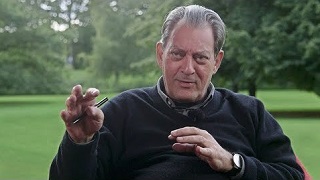
Paul Auster (Newark, 3 februari 1947)
De Nederlandse schrijver Jan Willem Holsbergen werd geboren in Rotterdam op 3 februari 1915. Zie ook alle tags voor Jan Willem Holsbergen op dit blog.
Uit: Bij de Huzaren
Paarden? Siekreten. Je heb mensen, die er sentimenteel over doen. Prachtige, edele dieren zeggen ze dan. D'r zijn natuurlijk wel mooie onder. Aan de manier waarop ze hun po, hun benen neerzetten en hun hals rekken zien de lui die d'r verstand van hebben of er wat in zit of niet. Ras bijvoorbeeld. Mooie krengen zeg ik, al kon ik er vroeger best mee opschieten.
En ik weet er van mee te praten, ik heb vroeger bij de huzaren gediend. Onder ritmeester Strooman, een fijne kerel. Ik heb nog meegemaakt, dat hij grootmajoor werd. In het rijden had ik wel aardigheid. Later nooit meer gedaan. Gek hè, daar kom je dan nooit toe.
Eerst denk je en dat ik ook, d'r is niks aan. Je gaat er op zitten en dat paard loopt wel. U hebt misschien als kind ook wel eens op een paard gezeten. Dat kan toch iedereen. Dat hebben ze ons daar even gauw afgeleerd. Dat was aantreden in de manege. Paard zonder zadel en dan risee en draven en maar zorgen, dat je d'r op bleef zitten. Later met een deken en weer later een engels zadel met stijgbeugels, dan een echt zadel en weer later met sporen. Daarmee prik je zogezegd dat beest in zijn flanken. Je moet ze wel gebruiken, want je brengt 'm d'r alles mee aan zijn verstand, zeker, wanneer je in kolonne rijdt.
Pikee riep je leermeester en dan had je maar model te zitten. Tenleste kreeg je er wel lol in. Zelfs in het stalwerk. Je maakte wat mee. Als zo'n kreng er geen zin in had en je zadelde 'm, dan liet ie zijn buik zakken. Dan kon je halen wat je wou. Maar als je erop zat, draaide het zadel mooi rond en dan kon je opnieuw beginnen. Daar hadden we een kunstje op, hoewel het verboden was. Je gaf 'm een knietje, dan trok die zijn buik in en jij trok meteen die buikriem aan. Weet u, zo met je knie in z'n pens. Even een weet, dat leer je van mekaar. Zo moet je altijd kletsen of vloeken als je met 'm bezig ben. Hij moet horen, dat je er ben. Anders schrikt-ie. Altijd dicht langs de benen en altijd van kop naar kont. Vanwege het trappen. Als je tegen z'n achterbenen aan gedrukt staat, kan die je alleen maar wegdouwen en da's nooit zo gevaarlijk als trappen. Dan versplintert je eigen poot. En maar kletsen, vleien of schelden, dat doet er niet toe.
Ja, van die grootmajoor, die ritmeester eerst, speet het me wel, zoals die man behandeld is geworden. Hij mocht me wel. Toen-ie hoorde dat ik kapper was ben ik al snel zijn oppasser geworden. Elke morgen om half negen schoor ik 'm en om de veertien dagen knippen. Engels model, op zij gedekt, niet zo kort en een brede scheiding. Zo dragen ze 't niet veel meer, maar 't is toch een goed model. Ik moest daar in huis komen wonen, in een villa, niet ver van de kazerne, waar het weiland in bos overgaat. Ik hoefde geen stalwerk meer te doen.”
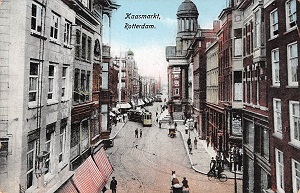
Jan Willem Holsbergen (3 februari 1915 – 20 mei 1995)
Ansichtkaart van Rotterdam met de Kaasmarkt en de RTM Tram, 1915
De Amerikaanse schrijver Richard Yates werd geboren op 3 februari 1926 in Yonkers, New York. Zie ook alle tags voor Richard Yates op dit blog.
Uit:Young Hearts Crying
“By the time he was twenty-three, Michael Davenport had learned to trust his own skepticism. He didn't have much patience with myths or legends of any kind, even those that took the form of general assumptions; what he wanted, always, was to get down to the real story.He had come of age as a waist-gunner on a B-17, toward the end of the war in Europe, and one of the things he'd liked least about the Army Air Force was its public-relations program. Everybody thought the Air Force was the luckiest, happiest branch of the service--better fed and quartered and paid than any other, given more personal freedom, given good clothes to be worn in a "casual" style. Everybody understood, too, that the Air Force couldn't be bothered with the petty side of military discipline: Flying and daring and high comradeship were esteemed over any blind respect for rank; officers and enlisted men could pal around together, if they felt like it, and even the regulation Army salute became a curled-up, thrown-away little mockery of itself in their hands. Soldiers of the ground forces were said to refer to them, enviously, as fly-boys.And all that stuff was probably harmless enough; it wasn't worth getting into any arguments about; but Michael Davenport would always know that his own Air Force years had been humbling and tedious and bleak, that his times in combat had come close to scaring the life out of him, and that he'd been enormously glad to get out of the whole lousy business when it was over.Still, he did bring home a few good memories. One was that he had lasted through the semifinals as a middieweight in the boxing tournament at Blanchard Field, Texas--not many other lawyers' sons from Morristown, New Jersey, could claim a thing like that. Another, which came to take on philosophical proportions the more he thought about it, was a remark made one sweltering afternoon by some nameless Blanchard Field gunnery instructor in the course of an otherwise boring lecture."Try to remember this, men.The mark of a professional in any line of work--I mean any line of work--is that he can make difficult things look easy."And even then, brought awake among the sleepy trainees by that piercing idea, Michael had known for some time what line of work it was that he wanted eventually to make his mark in as a professional: he wanted to write poems and plays.As soon as the Army set him free he went to Harvard, mostly because that was where his father had urged him to apply, and at first he was determined not to be taken in by any of the myths or legends of Harvard, either: he didn't even care to acknowledge, let alone to admire, the physical beauty of the place. It was "school," a school like any other, and as grimly eager as any other to collect its share of his GI Bill of Rights money.”
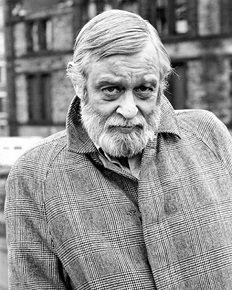
Richard Yates (3 februari 1926 – 7 november 1992)
De Zweedse schrijver Henning Mankell werd geboren in Stockholm op 3 februari 1948. Hij woont afwisselend in Mozambique en in zijn vaderland Zweden. Zie ook alle tags voor Henning Mankell op dit blog.
Uit: A Bridge to the Stars
“The dog.
That was what started it all.
If he hadn't seen that solitary dog, nothing might have happened. Nothing of what later became so important that it changed everything. Nothing of what was so exciting at first, but became so horrible.
It all started with the dog. The solitary dog he'd seen that night last winter when he'd suddenly woken up, got out of bed, tiptoed out to the window seat in the hall and sat down.
He had no idea why he'd woken up in the middle of the night.
Maybe he'd had a dream?
A nightmare that he couldn't recall when he woke up. Or maybe his dad had been snoring in the bedroom next to his own? His dad didn't often snore, but sometimes there might be an occasional one, a bit like a roar, and then it would be all quiet again.
Like a lion roaring in the winter's night.
But it was when he was sitting by the window in the hall that he saw the solitary dog.
The window had been covered in ice crystals, and he'd breathed onto the glass so that he could see out. The thermometer showed nearly thirty degrees below zero. And it was then, as he sat looking out of the window, that he'd caught sight of the dog. It ran out into the road, all on its own.
It stopped underneath the streetlamp, looked and sniffed in all directions, and set off running again. Then it vanished.
It was a familiar kind of dog, common in northern Sweden. A Norwegian elkhound. He'd managed to see that much. But why was it running around just there, all alone in the wintry night and the cold? Where was it heading? And why? And why did it look and sniff in all directions?
He'd had the impression that the dog was frightened of something.
He'd started to feel cold, but he stayed in the window, waiting for the dog to come back. But nothing happened. “
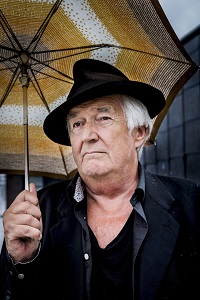
Henning Mankell (3 februari 1948 – 5 oktober 2015)
De Oekraïens-Duitse schrijfster, literatuurwetenschapster en journaliste Katja Petrovskaya werd geboren op 3 februari 1970 in Kiev. Zie ook alle tags voor Katja Petrovskaya op dit blog.
Uit: Vielleicht Esther
„Die Landschaft jedoch, die Namen der Orte und ein Gestüt für Araberpferde, das seit Anfang des neunzehnten Jahrhunderts existiert, gegründet nach dem Napoleonischen Krieg und in Fachkreisen die erste Adresse, das alles sei noch da, erzählten sie mir, das hätten sie alles gegoogelt. Ein Pferd könne dort gut eine Million Dollar kosten, Mick Jagger habe bei einer Auktion schon Pferde aus diesem Gestüt angeschaut, sein Drummer habe drei gekauft,und nun würden sie dorthin fahren, fünf Kilometer von der weißrussischen Grenze entfernt, Google sei Dank. Sogar einen Pferdefriedhof gebe es dort, nein,der jüdische Friedhof sei nicht erhalten geblieben, auch das stehe im Internet. I’m a Jew from Teheran, sagte der alte Mann, als wir noch am Bahnsteig standen, Samuel ist mein neuer Name. Ich bin aus Teheran nach New York gekommen, sagte Sam, er könne Aramäisch, habe vieles studiert und sei immer mit seiner Geige unterwegs. In den USA hätte er eigentlich Nuklearphysik studieren sollen, habe sich jedoch beim Konservatorium angemeldet, sei bei der Aufnahmeprüfung durchgefallen, und so sei er Banker geworden, und auch das sei er nicht mehr. Noch nach fünfzig Jahren, sagte seine Frau, als wir schon im Zug saßen und der metallene Regenbogen Bombardier Willkommen in Berlin nicht mehr auf unsere Köpfe drückte, da sagte seine Frau, egal ober Brahms, Vivaldi oder Bach spielt, alles klingt iranisch. Und er sagte, es sei Schicksal, dass sie mich getroffen hätten, ich sähe aus wie die iranischen Frauen seiner Kindheit, er hatte iranische Mütter sagen wollen, vielleicht wollte er sogar wie meine Mutter sagen, hielt sich aber zurück, und er fügte hinzu, es sei auch eine Schicksalsfügung, dass ich mich in der Familienforschung besser auskenne als sie und dass ich mit dem gleichen Ziel und dem gleichen Zug nach Polen fahre – falls man den Drang, nach Verschwundenem zu suchen, überhaupt als Ziel definieren dürfe, erwiderte ich.“
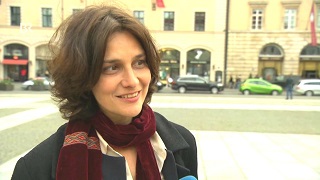
Katja Petrovskaya (Kiev, 3 februari 1970)
De Amerikaanse dichteres en schrijfster Gertrude Stein werd geboren op 3 februari 1874 in Allegheny (Pennsylvania). Zie ook alle tags voor Gertrude Stein op dit blog
Daughter
Why is the world at peace.
This may astonish you a little but when you realise how
easily Mrs. Charles Bianco sells the work of American
painters to American millionaires you will recognize that
authorities are constrained to be relieved. Let me tell you a
story. A painter loved a woman. A musician did not sing.
A South African loved books. An American was a woman
and needed help. Are Americans the same as incubators.
But this is the rest of the story. He became an authority.
America
Once in English they said America. Was it English to them.
Once they said Belgian.
We like a fog.
Do you for weather.
Are we brave.
Are we true.
Have we the national colour.
Can we stand ditches.
Can we mean well.
Do we talk together.
Have we red cross.
A great many people speak of feet.
And socks.
Cézanne
The Irish lady can say, that to-day is every day. Caesar can say that
every day is to-day and they say that every day is as they say.
In this way we have a place to stay and he was not met because
he was settled to stay. When I said settled I meant settled to stay.
When I said settled to stay I meant settled to stay Saturday. In this
way a mouth is a mouth. In this way if in as a mouth if in as a
mouth where, if in as a mouth where and there. Believe they have
water too. Believe they have that water too and blue when you see
blue, is all blue precious too, is all that that is precious too is all
that and they meant to absolve you. In this way Cézanne nearly did
nearly in this way. Cézanne nearly did nearly did and nearly did.
And was I surprised. Was I very surprised. Was I surprised. I was
surprised and in that patient, are you patient when you find bees.
Bees in a garden make a specialty of honey and so does honey. Honey
and prayer. Honey and there. There where the grass can grow nearly
four times yearly.
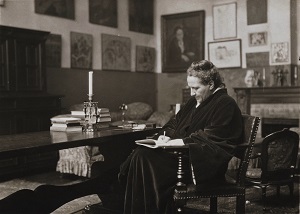
Gertrude Stein (3 februari 1874 – 27 juli 1946)
De Oostenrijkse dichter en schrijver Ferdinand Schmatz werd geboren op 3 februari 1953 in Korneuburg. Zie ook alle tags voor Ferdinand Schmatz op dit blog.
ja und neun
er führt, wenn lust ihn – trieb
ziert sich, wicht hin oder her,
keines falls vor macht –
zwar nichts, vielmehr gibt er an,
das ja, wohl, zu hören: nicht nein,
wenn er, in gier, aufs neue
verbötlich drängt - hin, eins mit sich,
die scheu, einst ihr mal, wich aus -
und er, erweicht, versteht es,
sich auf neun und noch mehr zehn, zu stützen
- um zu hören: ja, komm rein, zu zweien
sein facht sie an, macht er sich’s fein, gar raus?
psalm 150
(wie alles heeft, prijst graag)
1 ja, het schalt, zingt in den hogen het geprezene, vult de tent met blauw,
maar zingt het in slaap, als het maar het grote beklemtoont, als het in den
hogen wijst, wijdte die nooit nadert en juist die volledig is.
2 zingt in den hogen, wat zich in lofprijzing verzamelt, is altijd slechts
één, iedere daad heerlijk, draagt (op) en steekt (niet) omhoog, wat
het verschil uitmaakt: de schepping, de macht (binnen hem).
3 zingt in den hogen, de mond niet alleen, alles wat dient, blik,
letter, papier, snaar - bazuint, schrijft, citeert, klinkt
voort, het.
4 zingt in den hogen, op trommel of mond, alles draait om
zijn zij in het rond, fluit en slag.
5 zingt in den hogen, ook het donkerste staal, wordt licht, klinkt
goed (bombamdebimbam).
6 zingt in den hogen, alles wat ademt, lang en houdt aan (hem),
schalt, maar zingt het in slaap!
Vertaald door Geert van Istendael
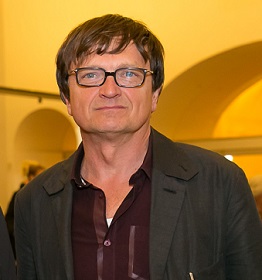
Ferdinand Schmatz (Korneuburg, 3 februai 1953)
Onafhankelijk van geboortedata
De Nederlandse dichteres Else Kemps werd geboren in Malden in 1995. Zie ook alle tags voor Else Kemps op dit blog.
De overblijfkinderen
een kind bereikt het toppunt van verveling
op het moment dat het te oud is voor vingerverven
maar te jong voor dubbelzinnigheid.
meester had de middagpauze lang voor de bel aangekondigd:
‘jullie zijn vandaag zo stuurs
dat jullie in stuitligging mijn strot uitkomen.’
Stefan maakte van zijn neusinhoud
een poppenkastpoppetje, naast me
centrifugeerde Freek zijn kwijl in zijn mond.
de overblijfjuf verbood de vingerverf
in verband met kans op kanker,
stond zichzelf toe
van onze namen verkleinwoorden te maken.
we keken lachend toe hoe Stefan de ruit insloeg
met een hamer, maakten kennis
met conciërgefilosofie: onkwetsbaarheid is een kwestie
van dubbelglas plaatsen.
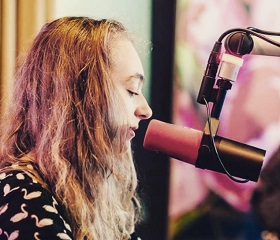
Else Kemps (Malden, 1995)
Zie voor nog meer schrijvers van de 3e februari ook mijn vorige blog van vandaag.
03-02-2019 om 14:20
geschreven door Romenu 
Tags:Georg Trakl, Paul Auster, Jan Willem Holsbergen, Richard Yates, Henning Mankell, Katja Petrovskaya, Gertrude Stein, Ferdinand Schmatz, Else Kemps, Frans Roumen, Romenu,
|

